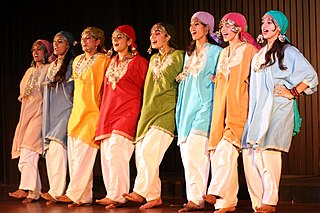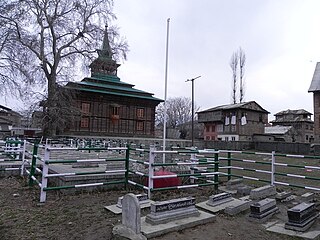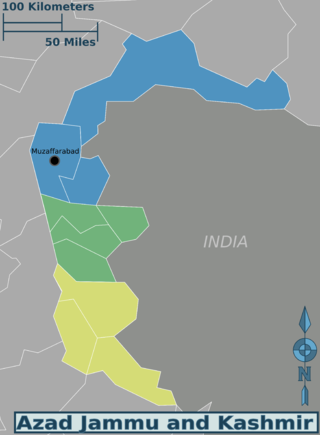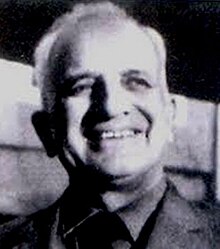
The Kashmir conflict is a territorial conflict over the Kashmir region, primarily between India and Pakistan, and also between China and India in the northeastern portion of the region. The conflict started after the partition of India in 1947 as both India and Pakistan claimed the entirety of the former princely state of Jammu and Kashmir. It is a dispute over the region that escalated into three wars between India and Pakistan and several other armed skirmishes. India controls approximately 55% of the land area of the region that includes Jammu, the Kashmir Valley, most of Ladakh, the Siachen Glacier, and 70% of its population; Pakistan controls approximately 30% of the land area that includes Azad Kashmir and Gilgit-Baltistan; and China controls the remaining 15% of the land area that includes the Aksai Chin region, the mostly uninhabited Trans-Karakoram Tract, and part of the Demchok sector.

Kashmiris are an Indo-Aryan ethnolinguistic group speaking the Kashmiri language and originating from the Kashmir Valley, which is today located in Indian-administered Jammu and Kashmir.
Prem Nath Dogra, also known as Pandit Prem Nath Dogra, was a leader from Jammu and Kashmir who worked for total integration of the state with India. He is commonly referred to as Sher e Duggar. He was instrumental in forming the Jammu Praja Parishad party in 1947 along with Balraj Madhok and opposed the policies of Sheikh Abdullah. He was later elected the president of Bharatiya Jana Sangh in 1955 for a brief period. He dedicated himself to the service of downtrodden poor and proletariat part of society.

Kashmiri Muslims are ethnic Kashmiris who practice Islam and are native to the Kashmir Valley, an area that includes the India-administered territories of Jammu and Kashmir and Ladakh, the Pakistan-administered territories of Azad Kashmir and Gilgit-Baltistan, and the Chinese-administered territories of Aksai Chin and the Trans-Karakoram Tract. The majority of Kashmiri Muslims are Sunni. They refer to themselves as "Koshur" in their mother language.
Pandit Taba Ram Turki lived at Rainawari, Srinagar and wrote Persian poetry under the pen name (takhalus) of Betab. Betab made an important contribution to the Persian poetry and he commanded great respect among the poets of Kashmir of his time. Betab was an exceptional poet whose Persian poetry reached as far as Central Asia. Some critics have rated Betab's works at par with the Shahnama of Firdausi. Betab was also proficient with reading and writing Arabic.
The Kashmiri diaspora refers to Kashmiris who have migrated out of the Kashmir into other areas and countries, and their descendants.

KashmirMartyrs' Day or Kashmir Day, was a former official state holiday observed in Kashmir in remembrance of 21 Muslim protesters killed on 13 July 1931 by Dogra forces of the princely state of Jammu and Kashmir in British India.

The Exodus of Kashmiri Hindus, or Pandits, is their early-1990 migration, or flight, from the Muslim-majority Kashmir valley in Indian-administered Kashmir following rising violence in an insurgency. Of a total Pandit population of 120,000–140,000 some 90,000–100,000 left the valley or felt compelled to leave by the middle of 1990, by which time about 30–80 of them are said to have been killed by militants.
The Jammu Praja Parishad was a political party active in the Jammu Division of the Indian-administered Jammu and Kashmir. It was founded in November 1947 by the Rashtriya Swayamsevak Sangh activist Balraj Madhok, and served as the main opposition party in the state. It maintained close ties with Bharatiya Jana Sangh during its lifetime and merged with the latter in 1963. Its main activity was to campaign for the close integration of Jammu and Kashmir with India and oppose the special status granted to the state under the Article 370 of the Indian constitution. After its merger with the Bharatiya Jana Sangh, the precursor of the present day Bharatiya Janata Party, the party gradually rose in stature. As an integral part of the Bharatiya Janata Party, it was a partner in the ruling coalition led by the People's Democratic Party.

After the Partition of India, during October–November 1947 in the Jammu region of the princely state of Jammu and Kashmir, many Muslims were massacred and others driven away to West Punjab. The killings were carried out by extremist Hindus and Sikhs, aided and abetted by the forces of Maharaja Hari Singh. The activists of the Rashtriya Swayamsevak Sangh (RSS) played a key role in planning and executing the riots. An estimated 20,000–100,000 Muslims were massacred. Subsequently, many non-Muslims were massacred by Pakistani tribesmen, in the Mirpur region of today's Pakistani administered Kashmir, and also in the Rajouri area of Jammu division.
The Kashmiris in Punjab are ethnic Kashmiris who have historically migrated from the Kashmir Valley and settled in the Punjab region. Many ethnic Muslim Kashmiris from the Kashmir Valley had migrated to the Punjab region during Sikh and Dogra rule.

In spring 1947, an uprising against the Maharaja Hari Singh of Jammu and Kashmir broke out in the Poonch jagir, an area bordering the Rawalpindi district of West Punjab and the Hazara district of the North-West Frontier Province in the future Pakistan. It was driven by grievances such as high taxes, the Maharaja's neglect of World War veterans, and above all, Muslim nationalism with a desire to join Pakistan. The leader of the rebellion, Sardar Muhammad Ibrahim Khan, escaped to Lahore by the end of August 1947 and persuaded the Pakistani authorities to back the rebellion. In addition to the backing, Prime Minister Liaquat Ali Khan authorised an invasion of the state, by the ex-Indian National Army personnel in the south and a force led by Major Khurshid Anwar in the north. These invasions eventually led to the First Kashmir War fought between India and Pakistan, and the formation of Azad Kashmir provisional government. The Poonch jagir has since been divided across Azad Kashmir, administered by Pakistan and the state of Jammu and Kashmir, administered by India.
Under Dogra rule, people in the princely state of Jammu and Kashmir launched several political movements. Despite ideological differences and varying goals they aimed to improve the status of Muslims in a state ruled by a Hindu dynasty.
William Alexander BrownMBESI was a British military officer based in British-ruled India. He is best known for his actions during the Partition of India, when he assisted the locals of the Gilgit Agency and led a coup d'état, codenamed Operation Datta Khel, against Hari Singh, the Maharaja of the erstwhile princely state of Jammu and Kashmir. The successful coup ultimately resulted in the Gilgit Agency becoming a part of Pakistani-administered Kashmir following the First Indo−Pakistani War.
The first election for a legislative assembly called Praja Sabha was held in 1934 in the princely state of Jammu and Kashmir in the British Indian Empire. The Praja Sabha was to have 75 members, of which 12 would be officials, 33 elected members and 30 nominated members. The election was held on 3 September 1934. The All Jammu and Kashmir Muslim Conference under the leadership of Sheikh Abdullah was the largest elected party with 16 seats won. A 'Liberal Group' championed by the Dogra Sadar Sabha had the overall majority in the Assembly with 24 members.
Bazaz is a Kashmiri Pandit clan and surname native to the Kashmir Valley of the Indian union territory of Jammu and Kashmir.






